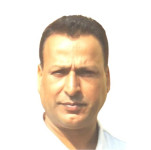
We use Google Cloud Translation Services. Google requires we provide the following disclaimer relating to use of this service:
This service may contain translations powered by Google. Google disclaims all warranties related to the translations, expressed or implied, including any warranties of accuracy, reliability, and any implied warranties of merchantability, fitness for a particular purpose, and noninfringement.

Highlights
- Primary elections are a very powerful method of empowering and empowering party members. which makes the party's internal democracy dynamic and prevents the top leader from becoming a dictator.



Royal reorganization is an important agenda of contemporary Nepalese politics. And, the important topic within that agenda is 'Primary Election'. That is, 'primary election'. It is certain that none of the political parties in Nepal will give new results in the status quo.

How do parties reach a new destination with the weight of failed leaders, traditional ideas, stale agenda, unquestioning cadres and corruption? Hence, reorganization is necessary in all parties (?). But there is so much dead peace within the parties that all is quiet. There is no confusion. Questions, criticism, dissatisfaction and rebellion are nowhere to be found. However, amidst this quiet peace, a debate is going on within the Nepali Congress. Whose main question is, what should be the politics of the future? What should the next Congress be? And what should be the next agenda?
To break the immobility within the Congress (is it possible?) the way Chief Minister Gagan Thapa, Vishwaprakash Sharma, Pradeep Paudel and friends are engaging in debate is very beautiful. And one (of many) important topics in that debate is the primary election. Like Nepali Congress in other parties, 'primary election' should become an important agenda of debate and internal democracy should be dynamic, with this intention, this article briefly discusses 'primary election' and its rationale.
story of the election?
How are candidates selected within the party? Let's hear some popular anecdotes. It is said that once a Nepali Congress leader went to the party president's yard to get a ticket for MP. He was also recommended by the district and was confident of getting the ticket. So excited. He stayed in the courtyard of the party chairman for the whole day. Knocked on the door, bowed dozens of times when he saw the leader on the balcony. After getting the ticket, he was congratulated by many. He also assured many. Called the allies in the constituency. But when it was evening, he only found out that the ticket had already been stolen by some brave man who sneaked in through the back door. When that brave man flew to the district with a helicopter to register his candidature, he was shocked.
We do not only have incidents of lost tickets, but also incidents of sales. Sometimes it also happens that a businessman comes to the party president's mansion. He chats alone with the chairman for a while. He has a black bag. On his way back, he hands over the bag to Madam President (could also be a private secretary) and leaves. The next day, when the party's candidate list is released, the name of the same businessman is at the top. What a surprise? Even a day before, Nadan party workers can get tickets themselves. He happily gives an interview on TV. Speaks on the radio. Writes a manifesto. Election expenses are paid by Joho. But while looking at the ticket, the trader will cut the ticket with a wound. Yesterday, whether it was in the Constituent Assembly election or in the federal and provincial elections, this has happened many times. The mayor's ticket will be distributed by Budhanilkanth or Balkot and local people should carry apjas. This has happened and will continue to happen. It seems that, if the status quo is left as it is, the party workers will only be loyal workers carrying banners in the campaign of the last election and someone else will print the tickets. What irony that real politics should lose in front of money!
What happened? Unfortunately, this is happening in almost every party today. One does the party work, the other gets the ticket. One is popular among the members, another becomes the favorite of the leader. Sometimes tickets are sold, sometimes tickets go to giveaways. Sometimes a merchant enters through the main door, sometimes a busy man buys a ticket from the window. Distortion is not enough. We have seen that the leader gave tickets to his wife and girlfriend. As we have seen, gangsters and corrupt people get tickets. Be it when appointing a candidate in the election or making a closed list of proportionals, there is a cow-jatra of self-interest everywhere. Money everywhere.
While all this is happening, not only tickets are being sold, but political integrity, ethics and democracy are being sold. It is not only defaming the party and the leader, it is defaming our elections. It is not only depriving honest and qualified workers of opportunities, it is also undermining the free conscience of voters. Thus the internal democracy of the party is weakened. Gradually factions and loot become dominant. And finally, democracy turns into dictatorship. Party members become fagot servants and the party becomes the president's private company. This is what is happening today.
primary election
Today, the debate continues around the world on how to deepen, broaden and expand democracy. The debate on how to stop the embezzlement of tickets and how to make elections effective has become the main debate of politics today. There are many uses and arrangements for that. If 'Right to Reject' or 'No Vote' is the arrangement made for that, another proposal or arrangement is 'Primary Election'. What is
, primary election? This is the primary election in which a political party chooses its candidate for public office. In which party members (voters) select their party's official candidate. The candidate who is most popular in the primary election. For example, if a person wants to be the official candidate of a party in a parliamentary election, he must first participate in the primary election held in his constituency. There he has to take the member's (voter's) vote. Whoever gets the most votes is the official candidate. It is a competition of merit among the aspirants.
It does not require the blessing of the party president, nor is the ticket auctioned. This process on one hand helps the political party to select the candidate, on the other hand the candidate himself is accountable to the members or voters. This stops buying and selling of tickets. Within the party, factionalism and bargaining is stopped. The syndicate within the party ends. This is a very powerful method of empowering and empowering party members. which makes the internal democracy of the party dynamic and protects the top leader from becoming a dictatorship.
practice and experience Among the countries that practice
'primary elections', America's practice is considered to be the most effective experience in the world. Which starts from 1890. It is believed to have been practiced informally at the county, state, and federal levels as early as the early 19th century. Later, the practice became widespread when the Democratic Party decided to adopt it as an important method of internal democracy. Along with the decision of the Democratic Party, the Republicans also came under pressure and accepted it. And, from 1904, it was legally enforced.
As we all know, there are mainly two major parties in the US, the Democratic Party and the Republican Party (although there are many other parties). But who is the president of that party? Usually we don't know. We know who the party's candidates and the president-elect were. How did we know? Because we have heard of many primaries and debates in which they have participated to be the party's official candidate. Let's think about who nominated Obama, Trump, Biden and Kamala?
Where did Obama come to be the president of the Democratic Party with such a long history at such a young age? Or how Trump from a business background suddenly came to be president from the Republican Party? How was it possible for them to run without the blessing of the party president? Did they not have to pay any attention to the powerful chairman of the party to be a candidate? Interestingly, nothing of the sort happened. They participated in the primary elections on their own initiative. Among the members, he proved himself worthy of being a presidential candidate. Members test their in the primary election. There were questions and answers, there was dialogue. The moral test was done. Ability was tested. And, after finally winning the primary election, they became the official presidential candidates.
In the early days of democratic practice, when any party nominated a candidate, it was considered natural and democratic for the respective party's sub-committee to sit in a closed room and decide. As the city committee will decide the candidate of the city. The regional committee will decide the candidate of the constituency. In the case of directly elected president or prime minister, the federal committee of any party will decide the candidate for that. However, it has also been narrowed down in Nepal.
because we still have the right to refuse the decision or recommendation from below or to appoint a candidate from Goji. But instead, when we debate the need for a wider and deeper democracy, the question arises, should we not change the undemocratic practices we have adopted to make candidates? Of course it should. Because the party members are said to be sovereign, but how is it possible to choose a candidate from the leader? It is called a clean election, but how about buying and selling tickets? To say that the party members are entitled members but the members themselves How can a
candidate be excluded from the selection process? When there is a debate about whether democracy should be expanded, made more accountable and deepened, primary elections are inseparable from it. Today, primary elections are an important method of increasing voter participation. Where they involve themselves right from the selection of candidates.
Wherever there is a practice of primary election, those practices say that primary election is an advanced and democratic method of taking the ticket from the pocket of the leader and giving it to the hands of the workers. Where a person who wants to be a candidate does not have to annoy the president, chairman or faction leader of a party. But he has to satisfy the party members or primary election voters. It is such a process of candidate selection, which makes the candidate selection process a matter of common concern of the members. Which contributes to making ticket distribution cultured, democratic, responsive and competitive. There are two main methods used in
primary elections. One open primary election and one closed primary election. 'Open Primary Election' is called 'Primary Election' which is indirect in nature. Similarly, a closed 'primary election' is called a 'primary election' of direct nature. In an open exercise, non-party voters also get to vote in candidate selection, but they must register their nominations for that purpose. In Bandh, only party members vote.
Is this possible in Nepal? is possible Ticket distribution is the most corrupt place in our electoral process. But when the method of early elections is adopted, corruption stops. Ticket sales will stop. It makes the candidate accountable to the general membership. Democracy and inter-party democracy liven up with healthy competition and debate in 'primary elections'. Voters get to vote for a candidate of their own choosing rather than being chosen by a person or a certain power base.
It strengthens party unity. And, it controls the factions, syndicates and individual arbitrariness within the party. The bottom line is that it is the voter's sovereign right to vote for the right candidate in a general election, and primary elections largely ensure that. And, primaries generally prevent the wrong people from getting into power. Which is an important political 'departure' in our context.
 प्रकाशित : भाद्र ३०, २०८१ ०७:३३
प्रकाशित : भाद्र ३०, २०८१ ०७:३३

 २६.१२°C काठमाडौं
२६.१२°C काठमाडौं














